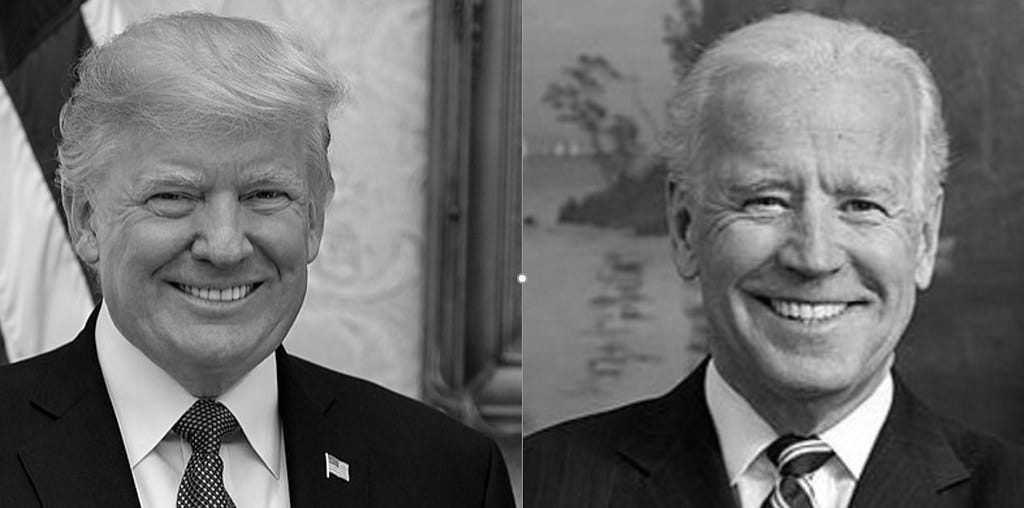Biden won't quit—yet
I watched the Biden v Trump debate expecting a train wreck. What I witnessed then and since was a cringe-worthy spectacle we should all be embarrassed of. It’s not going to get any better.
The first debate for the 2024 presidential hopefuls was vomit-inducing. In fact, even as someone who has watched presidential debates going back more than 30 years, this was by far the worst and most embarrassing. I could only watch it piecemeal, as I often muted the sound or averted my eyes, preferring to not see the former president lie nonstop or the current president barely recognize where he was.
I say again: Neither of these candidates is fit to be president of the United States.
As a conservative, I know that Republicans had far better options than Trump; the Dems should be charged with reckless endangerment for allowing Biden to run unopposed through the primary. We know now that anyone parroting the “Biden is fine,” “this is the best Biden” narrative was either insane or lying, or both.
You can only ignore the obvious for so long.
Confirming what we’ve known all along
Take a look at the two lines above. The one on the bottom is clearly shorter right? Surprisingly, the lines are the same length. Still, once you know the truth, it’s no easier to see them as anything but dissimilar. This optical illusion, known as the Müller-Lyer illusion, helps explain how I’ve come to think of Biden v Trump 2.0.
As hard as you try to make the case for one over the other, the fact remains that they are two grossly unfit characters for our nation’s highest office.
What the debate did for many Dems, however, is allow them to see the future as it is as opposed to how they wish it to be if they don’t replace Pres. Biden. Any willingness to play nice and allow Biden—who said in 2020 that he would only be a transition president—to run should have gone out the window as soon as he stumbled early in the debate. By the time he made the biggest stumble of the night—"We have 1,000 trillionaires in America” … "Excuse me"…"dealing with everything we have to do with…" “Look, if we finally beat Medicare"—it should have been all over but the shoutin’.
For Dems, the only thing worse than this terrible tumble was the split screen of Trump’s face, which had a look of curiosity and, almost, pity. Even the often-childlike former president could restrain himself in that moment, knowing as he did that nothing he could say would best the gift he was just handed in that moment. He had to be thinking “It’s over.” And it is, whether Biden realizes it or not.
Now comes the messy part: Getting him to step down and convincing Harris to step aside.
Neither will be easy, but both are necessities if the Dems want any chance of a respectable race.
Now what?
A lot of pundits far smarter than me have detailed the choices going forward for the Dems and what likely happens next. What hasn’t been talked or written about enough is why Biden is so recalcitrant, refusing to drop out even as calls for him to do so grow.
I have an idea, and it comes from behavioral economics: escalation of commitment, which describes the tendency to justify our actions to continue investments toward a decision or activity well despite the mounting evidence that future cost of continuing the action or behavior outweighs the intended result. Like you, I was very aware of sunk cost fallacy, but it wasn’t until I read cognitive scientist Annie Duke’s book Quit: The Power of Knowing When to Walk Away, that it made sense to me on a far broader scale.
In the book and in her writings, she shares vivid, harrowing and even extreme examples of people who, by any metric, should have long ago quit in the face of long odds and obviously terrible circumstances but failed to do so. One eye-opening story involved a marathon runner who, after snapping her fibula, refused to stop; she bandaged her leg and finished the final 18 miles.
Duke’s description of why folks in such dire straits refuse to quit is instructive:
“[W]hen we get bad news, we frequently do the opposite of what our intuition tells us that we would do. Instead of quitting, we double down, escalating our commitment, further entrapping ourselves in a losing cause. We see it everywhere: People staying too long in bad relationships, bad jobs, and bad careers; businesses continuing development and support of products that are clearly failing or long after conditions have changed; a nation sticking for decades in an unwinnable war.”
Sounds familiar, right?
“I am not going anywhere. … Any of these guys that don’t think I should run, run against me. Announce for president, challenge me at the convention.” —said Pres. Biden during a call in to MSNBC’s Morning Joe.
Biden isn’t delusional; he’s irrational.
Even though it would be days before I could watch the Biden v Trump debate in its entirety, I found myself saying the same words over and over.
“I don’t feel sorry for him.”
He’s too stubborn to make this decision alone, and now his family is circling the wagons even as some of his closet advisors are likely telling him to do the right thing and step aside. In his mind, he is doing the right thing. Each day he stays in the race is one day closer to the election in November. All he has to do is make it across the finish line.
However, like the marathon runner who ran most of the race on a broken leg, what he hasn’t—and probably won’t—considered is the damage being done while he continues running. In the runner’s case, immediate surgery was the result; for Biden, it's a Trump landslide. While it’s easy to psychologize about the reason’s Biden is staying the the raise, any behavioral economics fan recognizes it for what it is: an escalation of commitment to a failing course of action.
What makes this entire episode as shocking as it is sad is that the longer Biden stays in the race, the more he vindicates Trump and the Republican party, both of whom have been saying for years that the president is too feeble to lead. Before the debate, for example, I had conservative friends and longtime Republican-only voters say that they would vote for Biden over Trump. No more.
“Suddenly the race is about Biden,” said one friend. “He can’t do the job. Kamala is unelectable. And there is no clear choice to take the reins.”
Quitting is hard but sometimes necessary.
“What makes quitting so hard is that, if we quit, we fear that we will have failed and wasted our time, effort, or money. When we worry that quitting means failing, what exactly are we failing at? If we quit something that’s no longer worth pursuing, that’s not a failure. That’s a success. We need to start thinking about waste as a forward-looking problem, not a backward-looking one. That means realizing that spending another minute or another dollar or another bit of effort on something that is no longer worthwhile is the real waste.”
My prediction: Biden will drop out, but instead of Kamala doing the smart thing and exiting with him, she’ll run in his stead. No matter who she selects as a running mate, it won’t be enough to keep her from being the anchor that further (and faster) sinks the Dems’ ship.
I have a sneaky suspicion that Biden realizes as much and it’s part of the calculus he’s employing to justify staying in the race.





